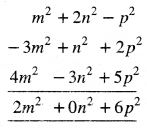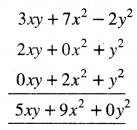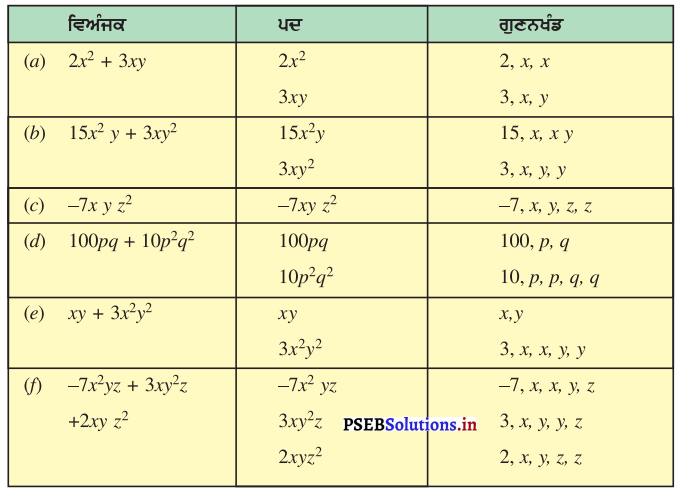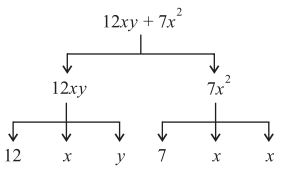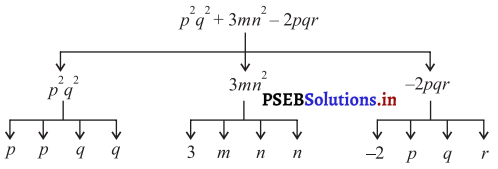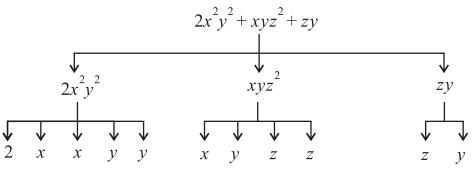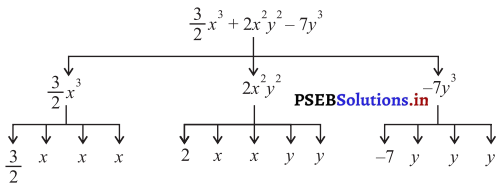Punjab State Board PSEB 8th Class Punjabi Book Solutions Punjabi Grammar Vachana, Vyakarana ਵਚਨ Textbook Exercise Questions and Answers.
PSEB 8th Class Punjabi Grammar ਵਚਨ (1st Language)
ਪ੍ਰਸ਼ਨ 1.
‘ਵਚਨ ਕਿਸ ਨੂੰ ਆਖਦੇ ਹਨ? ਇਹ ਕਿੰਨੇ ਪ੍ਰਕਾਰ ਦੇ ਹੁੰਦੇ ਹਨ? ਉਦਾਹਰਨਾਂ ਸਹਿਤ ਦੱਸੋ?
ਜਾਂ
ਵਚਨ ਦੀ ਪਰਿਭਾਸ਼ਾ ਲਿਖੋ। ਪੰਜਾਬੀ ਵਿਚ ਵਚਨ ਕਿਹੜੇ – ਕਿਹੜੇ ਹਨ? ਉਦਾਹਰਨਾਂ ਦੇ ਕੇ ਦੱਸੋ।
ਉੱਤਰ :
ਪਰਿਭਾਸ਼ਾ – ਇਕ ਜਾਂ ਬਹੁਤੀਆਂ ਚੀਜ਼ਾਂ, ਵਿਸ਼ੇਸ਼ਤਾਵਾਂ ਜਾਂ ਕਿਰਿਆਵਾਂ ਦੇ ਭੇਦ ਨੂੰ ਪ੍ਰਗਟ ਕਰਨ ਵਾਲੇ ਸ਼ਬਦ ਦਾ ਰੂਪ ਉਸ ਦਾ ਵਚਨ ਹੁੰਦਾ ਹੈ।
ਵਚਨ ਦੋ ਪ੍ਰਕਾਰ ਦਾ ਹੁੰਦਾ ਹੈ – ਇਕ – ਵਚਨ ਤੇ ਬਹੁ – ਵਚਨ।
(ੳ) ਇਕ – ਵਚਨ – ਸ਼ਬਦਾਂ ਦਾ ਜਿਹੜਾ ਰੂਪ ਕਿਸੇ ਚੀਜ਼, ਵਿਸ਼ੇਸ਼ਤਾ ਜਾਂ ਕਿਰਿਆ ਲਈ ਵਰਤਿਆ ਜਾਵੇ, ਉਸ ਨੂੰ ਇਕ – ਵਚਨ ਆਖਦੇ ਹਨ। ਪੰਜਾਬੀ ਵਿਚ ਇਸ ਦੇ ਦੋ ਰੂਪ ਹੁੰਦੇ ਹਨ, ਸਾਧਾਰਨ ਤੇ ਸੰਬੰਧਕੀ। ਇਸ ਦੇ ਦੋਵੇਂ ਰੂਪ ਹੇਠ ਲਿਖੇ ਵਾਕਾਂ ਤੋਂ ਸਪੱਸ਼ਟ ਹਨ
(ਉ) ਤੇਰਾ ਮੁੰਡਾ ਕਿੱਥੇ ਹੈ? (ਮੁੰਡਾ’ ਇਕ – ਵਚਨ ਸਧਾਰਨ ਰੂਪ)
(ਅ ਤੇਰੇ ਮੁੰਡੇ ਨੇ ਸਾਰਾ ਕੰਮ ਵਿਗਾੜ ਦਿੱਤਾ। (ਮੁੰਡੇ ਇਕ – ਵਚਨ ਸੰਬੰਧਕੀ ਰੂਪ

(ਅ) ਬਹੁ – ਵਚਨ – ਸ਼ਬਦਾਂ ਦਾ ਜਿਹੜਾ ਰੂਪ ਇਕ ਤੋਂ ਬਹੁਤੀਆਂ ਚੀਜ਼ਾਂ, ਵਿਸ਼ੇਸ਼ਤਾਵਾਂ ਜਾਂ ਕਿਰਿਆਵਾਂ ਲਈ ਵਰਤਿਆ ਜਾਵੇ, ਉਸ ਨੂੰ ਬਹੁ – ਵਚਨ ਆਖਦੇ ਹਨ। ਪੰਜਾਬੀ ਵਿਚ ਇਸ ਦੇ ਵੀ ਦੋ ਰੂਪ ਹੁੰਦੇ ਹਨ, ਸਧਾਰਨ ਤੇ ਸੰਬੰਧਕੀ ਨੇ ਇਹ ਦੋਵੇਂ ਰੂਪ ਹੇਠ ਲਿਖੇ ਵਾਕਾਂ ਤੋਂ ਸਪੱਸ਼ਟ ਹਨ
(ੳ) ਉਸ ਦੇ ਦੋ ਮੁੰਡੇ ਹਨ। (‘ਮੁੰਡੇ’ ਬਹੁ – ਵਚਨ, ਸਧਾਰਨ ਰੂਪ)
(ਅ) ਉਸ ਦੇ ਮੁੰਡਿਆਂ ਨੇ ਸਾਰਾ ਕੰਮ ਵਿਗਾੜ ਦਿੱਤਾ। (ਮੁੰਡਿਆਂ ਬਹੁ – ਵਚਨ, ਸੰਬੰਧਕੀ ਰੂਪ)
ਉਪਰੋਕਤ ਵਾਕਾਂ ਤੋਂ ਸਪੱਸ਼ਟ ਹੁੰਦਾ ਹੈ ਕਿ ਪੰਜਾਬੀ ਵਿਚ ਇਕ – ਵਚਨ ਤੇ ਬਹੁ – ਵਚਨ ਦੇ ਦੋ ਦੋ ਰੂਪ ਹੁੰਦੇ ਹਨ। ਦੋਹਾਂ ਦਾ ਇਕ ਸਧਾਰਨ ਰੂਪ ਹੁੰਦਾ ਹੈ ਤੇ ਦੂਜਾ ਸੰਬੰਧਕੀ। ਜਦੋਂ ਇਨ੍ਹਾਂ ਨਾਲ ਸੰਬੰਧਕ ਦਾ, ਦੇ, ਦੀਆਂ, ਨੇ, ਨੂੰ, ਲਈ, ਖ਼ਾਤਰ, ਤੋਂ ਆਦਿ ਦੀ ਵਰਤੋਂ ਹੁੰਦੀ ਹੈ, ਤਾਂ ਉਹ ਸੰਬੰਧਕੀ ਰੂਪ ਕਹਾਉਂਦਾ ਹੈ।
(ਨੋਟ – ਅਧਿਆਪਕਾਂ ਤੇ ਵਿਦਿਆਰਥੀਆਂ ਨੂੰ ਇਕ – ਵਚਨ ਤੇ ਬਹੁ – ਵਚਨ ਦੇ ਇਹੋ ਤਰੀਕੇ ਹੀ ਸਿੱਖਣੇ ਤੇ ਸਿਖਾਉਣੇ ਚਾਹੀਦੇ ਹਨ ਤੇ ਪੰਜਾਬੀ ਵਿਚ ਇਕ – ਵਚਨ ਤੇ ਬਹੁ – ਵਚਨ ਦੇ ਦੋ – ਦੋ ਰੂਪ ਹੀ ਲਿਖਣੇ ਚਾਹੀਦੇ ਹਨ !
ਹੇਠਾਂ ਦੇਖੋ ਵਚਨ ਬਦਲੀ ਦੇ ਕੁੱਝ ਨਿਯਮ :
1. ਜੇਕਰ ਪੁਲਿੰਗ ਸ਼ਬਦ ਦੇ ਅੰਤ ਵਿਚ ਕੰਨਾ (τ) ਹੋਵੇ, ਤਾਂ ਉਸ ਸ਼ਬਦ ਦੇ ਇਕ – ਵਚਨ ਤੇ ਬਹੁ – ਵਚਨ ਰੂਪ ਹੇਠ ਲਿਖੇ ਅਨੁਸਾਰ ਹੁੰਦੇ ਹਨ –
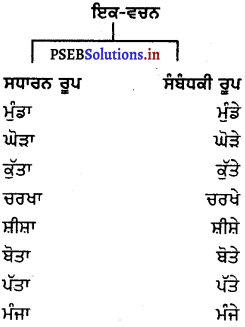
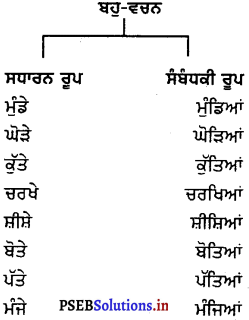
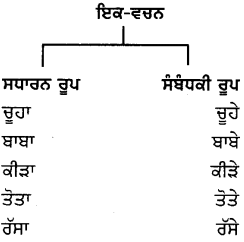
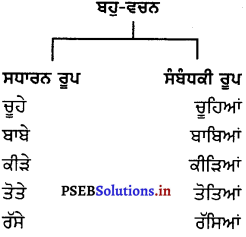
ਉੱਪਰਲੇ ਨੇਮ ਦਾ ਉਲੰਘਣ – ਕਈ ਕੰਨਾ ਅੰਤ ਵਾਲੇ ਪੁਲਿੰਗ ਨਾਂਵ ਅਜਿਹੇ ਹਨ, ਜਿਨ੍ਹਾਂ ਦੇ ਇਕ – ਵਚਨ ਅਤੇ ਬਹੁ – ਵਚਨ ਸ਼ਬਦਾਂ ਦਾ ਰੂਪ ਇੱਕੋ ਹੀ ਹੁੰਦਾ ਹੈ; ਜਿਵੇਂ –
(ੳ) ਸਤਲੁਜ ਪੰਜਾਬ ਦਾ ਇਕ ਦਰਿਆ ਹੈ। (ਇਕ – ਵਚਨ)
ਪੰਜਾਬ ਵਿਚ ਬਹੁਤ ਸਾਰੇ ਦਰਿਆ ਹਨ। (ਬਹੁ – ਵਚਨ)
(ਅ) ਉਸ ਦਾ ਇਕ ਭਰਾ ਹੈ। (ਇਕ – ਵਚਨ)
ਮੇਰੇ ਤਿੰਨ ਭਰਾ ਹਨ। (ਬਹੁ – ਵਚਨ)

2. ਜਿਨ੍ਹਾਂ ਪੁਲਿੰਗ ਸ਼ਬਦਾਂ ਦੇ ਅੰਤ ਵਿਚ ਕੰਨਾ (τ) ਨਹੀਂ ਹੁੰਦਾ, ਉਹਨਾਂ ਦੇ ਇਕ – ਵਚਨ ਤੇ ਬਹੁ – ਵਚਨ ਰੂਪ ਹੇਠ ਲਿਖੇ ਅਨੁਸਾਰ ਬਣਦੇ ਹਨ –
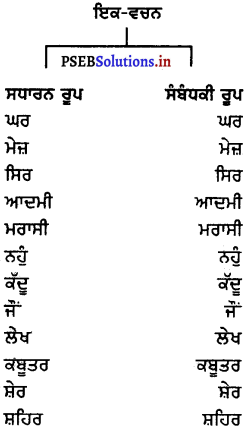
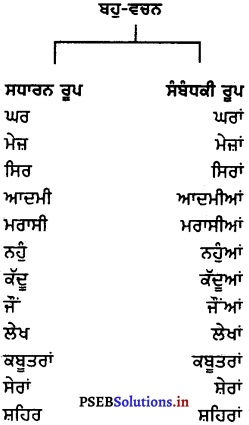
3. ਕਈ ਪੁਲਿੰਗ ਸ਼ਬਦਾਂ ਦਾ ਇਕ – ਵਚਨ ਰੂਪ ਹੀ ਨਹੀਂ, ਸਗੋਂ ਉਹ ਬਹੁ – ਵਚਨ ਰੂਪ ਵਿਚ , ਹੀ ਹੁੰਦੇ ਹਨ, ਜਿਵੇਂ – ਦਾਦਕੇ, ਨਾਨਕੇ, ਮਾਮੇ।

4. ਜੇਕਰ ਇਸਤਰੀ ਲਿੰਗ ਸ਼ਬਦਾਂ ਦੇ ਅੰਤ ਵਿਚ ਬਿਹਾਰੀ (), ਦੁਲੈਂਕੜ () ਹੋੜਾ ( ) ਜਾਂ ਕਨੌੜਾ (*) ਲੱਗਾ ਹੋਵੇ, ਤਾਂ ਉਨ੍ਹਾਂ ਦਾ ਇਕ – ਵਚਨ ਤੇ ਬਹੁ – ਵਚਨ ਰੂਪ ਹੇਠ ਲਿਖੇ ਅਨੁਸਾਰ ਹੁੰਦਾ ਹੈ। ਇਨ੍ਹਾਂ ਵਿਚ ਬਹੁ – ਵਚਨ ਸ਼ਬਦ ਬਣਾਉਣ ਲਈ ‘ਆਂ’ ਦਾ ਵਾਧਾ ਕੀਤਾ ਜਾਂਦਾ ਹੈ :
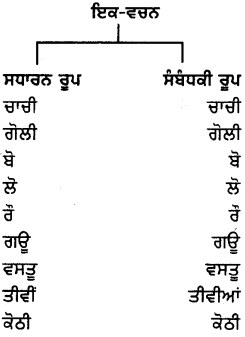
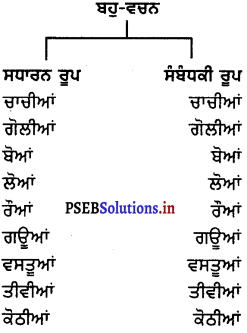
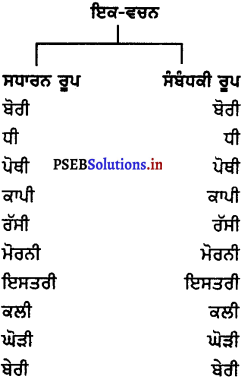

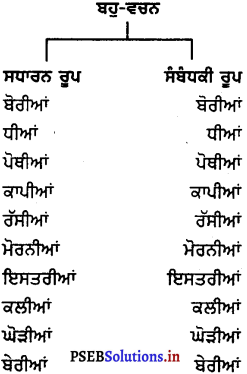
5. ਜਿਨ੍ਹਾਂ ਇਸਤਰੀ ਲਿੰਗ ਸ਼ਬਦਾਂ ਦੇ ਅੰਤ ਵਿਚ ਮੁਕਤਾ ਹੋਵੇ, ਉਨ੍ਹਾਂ ਦਾ ਬਹੁ – ਵਚਨ ਕੰਨਾ ਤੇ ਬਿੰਦੀ () ਵਧਾਉਣ ਨਾਲ ਬਣਦਾ ਹੈ; ਜਿਵੇਂ –

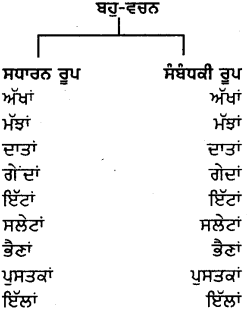

6. ਜਿਨ੍ਹਾਂ ਇਸਤਰੀ ਲਿੰਗ ਨਾਂਵਾਂ ਦੇ ਅੰਤ ਵਿਚ ਕੰਨਾ ਬਿੰਦੀ ਹੋਵੇ, ਉਨ੍ਹਾਂ ਦਾ ਬਹੁ – ਵਚਨ ‘ਬੰਦੀ ਹਟਾ ਕੇ ‘ਤੇ “ਵਾਂ ‘ਜਾਂ “ਈਆਂ ਵਧਾਇਆਂ ਬਣਦਾ ਹੈ; ਜਿਵੇਂ –
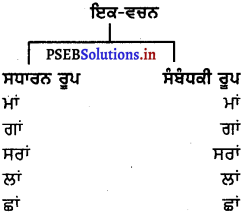
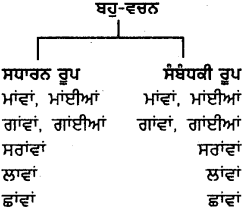
7. ਜਿਨ੍ਹਾਂ ਇਸਤਰੀ ਲਿੰਗ ਨਾਂਵਾਂ ਦੇ ਅੰਤ ਵਿਚ ‘ਕੰਨਾ ਹੋਵੇ, ਉਨ੍ਹਾਂ ਦਾ ਬਹੁ – ਵਚਨ “ਵਾਂ ਵਧਾ ਕੇ ਬਣਾਇਆ ਜਾਂਦਾ ਹੈ , ਜਿਵੇਂ –
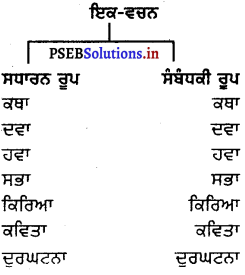
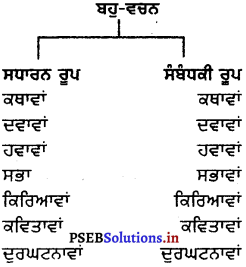

ਪ੍ਰਸ਼ਨ 2.
ਹੇਠ ਲਿਖੇ ਵਾਕਾਂ ਵਿਚਲੇ ਨਾਂਵ ਸ਼ਬਦਾਂ ਦੇ ਵਚਨ ਬਦਲ ਕੇ ਵਾਕ ਨੂੰ ਦੁਬਾਰਾ ਲਿਖੋ –
(ਉ) ਲੜਕਾ ਗੀਤ ਗਾ ਰਿਹਾ ਹੈ।
(ਆਂ) ਪੰਛੀ ਅਕਾਸ਼ ਵਿਚ ਉਡਾਰੀ ਮਾਰ ਰਿਹਾ ਹੈ।
(ਈ) ਚਿੜੀ ਚੀਂ – ਚੀਂ ਕਰਦੀ ਹੈ।
(ਸ) ਪੁਸਤਕ ਅਲਮਾਰੀ ਵਿਚ ਪਈ ਹੈ।
(ਹ) ਕੁੜੀ ਰੌਲਾ ਪਾ ਰਹੀ ਹੈ।
(ਕ) ਸ਼ੇਰਨੀ ਜੰਗਲ ਵਿਚ ਫਿਰਦੀ ਹੈ।
(ਖ) ਅੰਬ ਮਿੱਠਾ ਤੇ ਸੁਆਦੀ ਹੈ।
(ਗ) ਤੇ ਕਿਸਾਨ ਹਲ ਚਲਾ ਰਿਹਾ ਹੈ।
(ਯ) ਮੇਰੇ ਮਿੱਤਰ ਕੋਲ ਬੱਕਰੀ ਹੈ।
(ਝ) ਕੁੜੀ ਟੈਲੀਫੋਨ ‘ਤੇ ਗੱਲ ਕਰ ਰਹੀ ਹੈ।
ਉੱਤਰ :
(ਉ) ਲੜਕੇ ਗੀਤ ਗਾ ਰਹੇ ਹਨ।
(ਅ) ਪੰਛੀ ਅਕਾਸ਼ਾਂ ਵਿਚ ਉਡਾਰੀਆਂ ਮਾਰ ਰਹੇ ਹਨ।
(ਈ) ਚਿੜੀਆਂ ਚੀਂ – ਚੀਂ ਕਰਦੀਆਂ ਹਨ।
(ਸ) ਪੁਸਤਕਾਂ ਅਲਮਾਰੀਆਂ ਵਿਚ ਪਈਆਂ ਹਨ।
(ਹ) ਕੁੜੀਆਂ ਰੌਲਾ ਪਾ ਰਹੀਆਂ ਹਨ।
(ਕ) ਸ਼ੇਰਨੀਆਂ ਜੰਗਲਾਂ ਵਿਚ ਫਿਰਦੀਆਂ ਹਨ।
(ਖ) ਅੰਬ ਮਿੱਠੇ ਤੇ ਸੁਆਦੀ ਹਨ।
(ਗ) ਕਿਸਾਨ ਹਲ ਚਲਾ ਰਹੇ ਹਨ।
(ਯ) ਸਾਡੇ ਮਿੱਤਰਾਂ ਕੋਲ ਬੱਕਰੀਆਂ ਹਨ।
(ਝ) ਕੁੜੀਆਂ ਟੈਲੀਫੋਨਾਂ ‘ਤੇ ਗੱਲਾਂ ਕਰ ਰਹੀਆਂ ਹਨ।
ਪ੍ਰਸ਼ਨ 3.
ਹੇਠ ਲਿਖੇ ਵਾਕਾਂ ਨੂੰ ਵਚਨ ਬਦਲ ਕੇ ਲਿਖੋ
(ਉ) ਨਿੱਕਾ ਮੁੰਡਾ ਪਲੇਟ ਵਿਚੋਂ ਚਮਚੇ ਨਾਲ ਆਈਸਕਰੀਮ ਖਾ ਰਿਹਾ ਹੈ !
(ਅ) ਠੰਢੀ ਹਵਾ ਚਲ ਰਹੀ ਹੈ।
(ਈ) ਮੈਂ ਤੇਰੀ ਮੱਦਦ ਨਹੀਂ ਕਰ ਸਕਦਾ।
(ਸ) ਬੱਚਾ ਗੇਂਦ ਨਾਲ ਖੇਡ ਰਿਹਾ ਹੈ।
ਉੱਤਰ :
(ੳ) ਨਿੱਕੇ ਮੁੰਡੇ ਪਲੇਟਾਂ ਵਿਚੋਂ ਚਮਚਿਆਂ ਨਾਲ ਆਈਸਕਰੀਮਾਂ ਖਾ ਰਹੇ ਹਨ।
(ਅ) ਠੰਢੀਆਂ ਹਵਾਵਾਂ ਚਲ ਰਹੀਆਂ ਹਨ।
(ਈ) ਅਸੀਂ ਤੁਹਾਡੀਆਂ ਮੱਦਦਾਂ ਨਹੀਂ ਕਰ ਸਕਦੇ।
(ਸ) ਬੱਚੇ ਗੇਂਦਾਂ ਨਾਲ ਖੇਡ ਰਹੇ ਹਨ।

ਪ੍ਰਸ਼ਨ 4.
ਹੇਠ ਲਿਖੇ ਵਾਕਾਂ ਵਿਚੋਂ ਨਾਂਵ ਸ਼ਬਦਾਂ ਦੇ ਵਚਨ ਬਦਲ ਕੇ ਮੁੜ ਲਿਖੋ :
(ਉ) ਉਹ ਆਪਣਾ ਘੋੜਾ, ਬੱਕਰੀ ਤੇ ਬੋਤਾ ਲੈ ਕੇ ਘਰ ਨੂੰ ਚਲਾ ਗਿਆ।
(ਆ) ਉਹ ਆਪਣੀ ਗਾਂ, ਮੱਝ ਤੇ ਕੁੱਤਾ ਲੈ ਕੇ ਘਰ ਨੂੰ ਚਲਾ ਗਿਆ।
(ਈ) ਮਾਂ ਠੰਢੀ ਛਾਂ।
(ਸ) ਅੱਜ ਬਹੁਤ ਠੰਢੀ ਹਵਾ ਚਲ ਰਹੀ ਹੈ।
(ਹ) ਦੁਕਾਨ ਤੇ ਕਾਰੀਗਰ ਮੇਜ਼ ਬਣਾ ਰਿਹਾ ਹੈ।
ਉੱਤਰ :
(ੳ) ਉਹ ਆਪਣੇ ਘੋੜੇ, ਬੱਕਰੀਆਂ ਤੇ ਖੋਤੇ ਲੈ ਕੇ ਘਰਾਂ ਨੂੰ ਚਲੇ ਗਏ।
(ਆ) ਉਹ ਆਪਣੀਆਂ ਗਾਵਾਂ, ਮੱਝਾਂ ਤੇ ਕੁੱਤੇ ਲੈ ਕੇ ਘਰਾਂ ਨੂੰ ਚਲੇ ਗਏ।
(ਈ) ਮਾਂਵਾਂ ਠੰਢੀਆਂ ਛਾਵਾਂ।
(ਸ) ਅੱਜ ਬਹੁਤ ਠੰਢੀਆਂ ਹਵਾਵਾਂ ਚਲ ਰਹੀਆਂ ਹਨ।
(ਹ) ਦੁਕਾਨਾਂ ‘ਤੇ ਕਾਰੀਗਰ ਮੇਜ਼ ਬਣਾ ਰਹੇ ਹਨ।
ਪ੍ਰਸ਼ਨ 5.
ਹੇਠ ਲਿਖੇ ਨਾਂਵ ਸ਼ਬਦਾਂ ਦੇ ਵਚਨ ਬਦਲ ਕੇ ਵਾਰ ਦੁਬਾਰਾ ਲਿਖੋ
(ਉ) ਮਾਂ ਨੇ ਆਪਣੀ ਧੀ ਨੂੰ ਅਸੀਸ ਦਿੱਤੀ।
(ਅ) ਉਹ ਆਪਣਾ ਕੁੱਤਾ, ਘੋੜਾ ਤੇ ਬਲਦ ਲੈ ਕੇ ਖੇਤ ਨੂੰ ਚਲਾ ਗਿਆ।
(ਈ) ਕੁੱਤਾ ਚੱਕੀ ਜ਼ਰੂਰ ਚੱਟੇਗਾ।
(ਸ) ਵਿਹੜੇ ਵਿਚ ਬੈਠੀ ਕੁੜੀ ਕਸੀਦਾ ਕੱਢ ਰਹੀ ਸੀ।
ਉੱਤਰ :
(ੳ) ਮਾਂਵਾਂ ਨੇ ਆਪਣੀਆਂ ਧੀਆਂ ਨੂੰ ਅਸੀਸਾਂ ਦਿੱਤੀਆਂ।
(ਅ) ਉਹ ਆਪਣੇ ਕੁੱਤੇ, ਘੋੜੇ ਤੇ ਬਲ਼ਦ ਲੈ ਕੇ ਖੇਤਾਂ ਨੂੰ ਚਲੇ ਗਏ।
(ਈ) ਕੁੱਤੇ ਚੱਕੀਆਂ ਜ਼ਰੂਰ ਚੱਟਣਗੇ।
(ਸ) ਵਿਹੜਿਆਂ ਵਿਚ ਬੈਠੀਆਂ ਕੁੜੀਆਂ ਕਸੀਦੇ ਕੱਢ ਰਹੀਆਂ ਸਨ।

ਪ੍ਰਸ਼ਨ 6.
ਹੇਠ ਲਿਖੇ ਵਾਕਾਂ ਵਿਚੋਂ ਨਾਂਵ ਸ਼ਬਦਾਂ ਦੇ ਵਚਨ ਬਦਲ ਕੇ ਵਾਕਾਂ ਨੂੰ ਮੁੜ ਲਿਖੋ
(ਉ) ਮਦਾਰੀ ਦੇ ਥੈਲੇ ਵਿਚ ਘੜੀ ਤੇ ਸੂਈ ਸੀ।
(ਆ) ਚਿੜੀ ਦੇ ਬੱਚੇ ਨੇ ਮੁੰਹ ਬਾਹਰ ਕੱਢਿਆ।
(ਈ) ਕੁੜੀਆਂ ਤਿੰਝਣ ਵਿਚ ਚਰਖਾ ਚਲਾ ਰਹੀਆਂ ਹਨ ਤੇ ਗੀਤ ਗਾ ਰਹੀਆਂ ਹਨ।
(ਸ) ਮੇਰੇ ਕੋਲ ਕੁੱਤਾ, ਬੱਕਰੀ, ਮੱਝ ਤੇ ਘੋੜਾ ਸਨ।
(ਰ) ਕੁੜੀ ਕਸੀਦਾ ਕੱਢ ਰਹੀ ਸੀ !
(ਕ) ਮੇਰੇ ਮਿੱਤਰ ਨੇ ਪੁਰਾਣੀ ਕਾਰ ਖ਼ਰੀਦੀ ਹੈ।
(ਖ) ਸਾਧ ਨੇ ਮਾਈ ਨੂੰ ਪੁੱਤਰ ਦਾ ਵਰ ਦਿੱਤਾ।
ਉੱਤਰ :
(ੳ) ਮਦਾਰੀਆਂ ਦੇ ਥੈਲਿਆਂ ਵਿਚ ਘੜੀਆਂ ਤੇ ਸੂਈਆਂ ਸਨ।
(ਅ) ਚਿੜੀਆਂ ਦੇ ਬੱਚਿਆਂ ਨੇ ਮੂੰਹ ਬਾਹਰ ਕੱਢੇ।
(ਈ) ਕੁੜੀ ਤਿੰਵਣ ਵਿਚ ਚਰਖਾ ਚਲਾ ਰਹੀ ਸੀ ਤੇ ਗੀਤ ਗਾ ਰਹੀ ਸੀ।
(ਸ) ਸਾਡੇ ਕੋਲ ਕੁੱਤੇ, ਬੱਕਰੀਆਂ, ਮੱਝਾਂ ਤੇ ਘੋੜੇ ਸਨ !
(ਕ) ਕੁੜੀਆਂ ਕਸੀਦਾ ਕੱਢ ਰਹੀਆਂ ਸਨ।
(ਰ) ਸਾਡੇ ਮਿੱਤਰਾਂ ਨੇ ਪੁਰਾਣੀਆਂ ਕਾਰਾਂ ਖਰੀਦੀਆਂ ਹਨ।
(ਖ) ਸਾਧਾਂ ਨੇ ਮਾਈਆਂ ਨੂੰ ਪੁੱਤਰਾਂ ਦੇ ਵਰ ਦਿੱਤੇ।
ਪ੍ਰਸ਼ਨ 7.
ਹੇਠ ਲਿਖੇ ਵਾਕਾਂ ਵਿਚ ਆਏ ਨਾਂਵ ਸ਼ਬਦਾਂ ਦੇ ਵਚਨ ਬਦਲ ਕੇ ਵਾਕ ਮੁੜ ਲਿਖੋ
(ਉ) ਕੁੜੀ ਗਿੱਧੇ ਵਿਚ ਨੱਚ ਕੇ ਬੋਲੀ ਪਾ ਰਹੀ ਹੈ !
(ਅ) ਕਿਸਾਨ ਨੇ ਮੱਝ, ਬੱਕਰੀ, ਗਊ ਤੇ ਕੁੱਤੇ ਨੂੰ ਖੇਤ ਵਿਚ ਖੁੱਲ੍ਹਾ ਛੱਡ ਦਿੱਤਾ।
(ਈ) ਸਪੇਰੇ ਨੇ ਬੀਨ ਵਜਾਈ ਤੇ ਕਾਲੇ ਨਾਗ ਨੂੰ ਵੱਸ ਵਿਚ ਕਰ ਲਿਆ।
(ਸ) ਦਰਿਆ ਦੇ ਕਿਨਾਰੇ ਸਾਧੂ ਨੇ ਧੂਣੀ ਲਾ ਲਈ।
(ਹ) ਅੱਜ ਸਵੇਰੇ ਤੋਂ ਹੀ ਠੰਢੀ ਹਵਾ ਚਲ ਰਹੀ ਹੈ।
(ਕ) ਮੈਂ ਉਸਦੀ ਕਿਤਾਬ ਲੈ ਕੇ ਪੜ੍ਹੀ।
(ਖ ਭੰਗੜੇ ਵਿਚ ਨੱਚਦੇ ਗੱਭਰੂ ਨੂੰ ਦੇਖ ਕੇ ਬੁੱਢੇ ਤੇ ਮੁੰਡੇ ਵੀ ਨੱਚਣ ਲੱਗ ਪਏ।
(ਗ) ਮੱਝ, ਗਾਂ ਤੇ ਬੱਕਰੀ ਖੇਤ ਵਿਚ ਚੁਗ ਰਹੀ ਸੀ।
ਉੱਤਰ :
(ੳ) ਕੁੜੀਆਂ ਗਿੱਧੇ (ਗਿੱਧਿਆਂ ਵਿਚ ਨੱਚ ਕੇ ਬੋਲੀਆਂ ਪਾ ਰਹੀਆਂ ਹਨ।
(ਅ) ਕਿਸਾਨਾਂ ਨੇ ਮੱਝਾਂ, ਬੱਕਰੀਆਂ, ਗਊਆਂ ਤੇ ਕੁੱਤਿਆਂ ਨੂੰ ਖੇਤਾਂ ਵਿਚ ਖੁੱਲ੍ਹੇ ਛੱਡ ਦਿੱਤਾ।
(ਈ) ਸਪੇਰਿਆਂ ਨੇ ਬਿਨਾਂ ਵਜਾਈਆਂ ਤੇ ਕਾਲਿਆਂ ਨਾਗਾਂ ਨੂੰ ਵੱਸ ਵਿਚ ਕਰ ਲਿਆ।
(ਸ) ਦਰਿਆਵਾਂ ਦਿਆਂ ਕਿਨਾਰਿਆਂ ‘ਤੇ ਸਾਧੂਆਂ ਨੇ ਧੂਣੀਆਂ ਲਾ ਲਈਆਂ।
(ਹ) ਅੱਜ ਸਵੇਰੇ ਤੋਂ ਹੀ ਠੰਢੀਆਂ ਹਵਾਵਾਂ ਚਲ ਰਹੀਆਂ ਹਨ।
(ਕ) ਅਸੀਂ ਉਨ੍ਹਾਂ ਦੀਆਂ ਕਿਤਾਬਾਂ ਲੈ ਕੇ ਪੜ੍ਹੀਆਂ।
(ਖ) ਭੰਗੜੇ ਵਿਚ ਨੱਚਦੇ ਗੱਭਰੂਆਂ ਨੂੰ ਦੇਖ ਕੇ ਬੁੱਢਾ ਤੇ ਮੁੰਡਾ ਵੀ ਨੱਚਣ ਲੱਗ ਪਏ।
(ਗ) ਮੱਝਾਂ, ਗਾਈਆਂ ਤੇ ਬੱਕਰੀਆਂ ਖੇਤ ਵਿਚ ਚੁਗ ਰਹੀਆਂ ਸਨ।

ਪ੍ਰਸ਼ਨ 8.
ਹੇਠ ਲਿਖੇ ਵਾਕਾਂ ਵਿਚ ਨਾਂਵ ਸ਼ਬਦਾਂ ਦੇ ਵਚਨ ਬਦਲ ਕੇ ਵਾਕ ਮੁੜ ਲਿਖੋ
(ੳ) ਰਾਜੇ ਨੇ ਮੰਗਤੇ ਨੂੰ ਤਨ ਦਾ ਕੱਪੜਾ ਦਿੱਤਾ।
(ਅ) ਨਿੱਕਾ ਮੁੰਡਾ ਪਲੇਟ ਵਿਚ ਆਈਸ ਕਰੀਮ ਖਾ ਰਿਹਾ ਹੈ।
(ਈ) ਲਾਲ ਘੋੜਾ ਤੇ ਚਿੱਟਾ ਕੁੱਤਾ ਦੌੜ ਲਾ ਰਹੇ ਹਨ।
ਉੱਤਰ :
(ੳ) ਰਾਜਿਆਂ ਨੇ ਮੰਗਤਿਆਂ ਨੂੰ ਤਨ ਦੇ ਕੱਪੜੇ ਦਿੱਤੇ।
(ਅ) ਨਿੱਕੇ ਮੁੰਡੇ ਪਲੇਟਾਂ ਵਿਚ ਆਈਸ – ਕਰੀਮਾਂ ਖਾ ਰਹੇ ਹਨ।
(ਈ) ਲਾਲ ਘੋੜੇ ਤੇ ਚਿੱਟੇ ਕੁੱਤੇ ਦੌੜਾਂ ਲਾ ਰਹੇ ਹਨ।
![]()

























